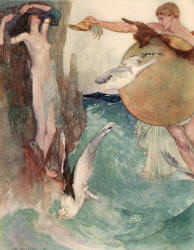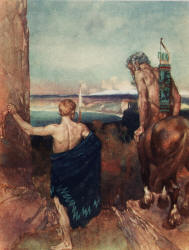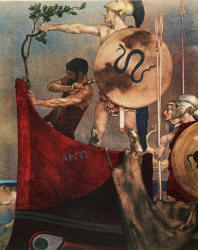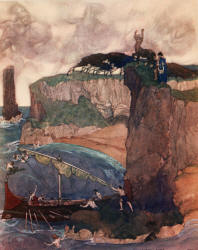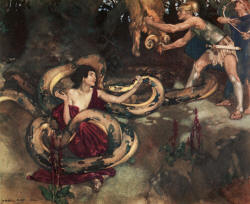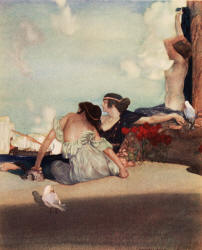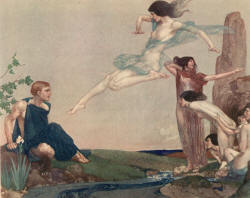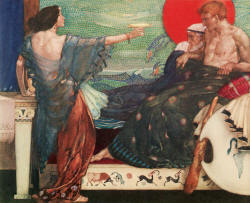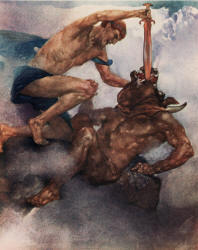|
Charles Kingsley's Introduction
to "The Heroes; or, Greek Fairy Tales for My Children"
My dear Children
Some of you have heard already of the old Greeks; and
all of you, as you grow up, will hear more and more of them. Those of you who are boys will, perhaps, spend a great
deal
of time in reading Greek books; and the girls, though they may not learn Greek, will be sure to come across a
great many stories taken from Greek history, and to see, I may say
every day, things which we should not have had if it
had not been for these old Greeks. You can hardly find a well-written book which has not in it Greek names, and words, and
proverbs; you cannot walk through a great town without passing Greek buildings; you cannot go into a well-furnished
room without seeing Greek statues and ornaments, even
Greek patterns of furniture and paper; so strangely have
these old Greeks left their mark behind them upon this modern world in which we no live. And as you grow up, and read
more
and more, you will find that we owe to these old Greeks the beginnings of all our mathematics and geometry - that
is, the science and knowledge of numbers, and of the
shapes of things, and of the forces which make things move and
stand at rest; and the beginnings of our geography and astronomy; and of our laws, and freedom, and politics -
that is,
the science of how to rule a country, and make it peaceful and strong. And we owe to them, too, the beginning of our logic -
that is, the study of words and of reasoning;
and of our meta-physics - that is, the study of our own thoughts
and souls. And last of all, they made their language so beautiful that foreigners used to take to it instead of their
own; and
at last Greek became the common language of educated people all over the world, from Persia and Egypt even to Spain and
Britain. And therefore it was that the New
Testament was written in Greek, that it might be read and understood
by all the nations of the Roman empire; so that, next to the Jews, and the Bible which the Jews handed
down to use, we owe
more to these old Greeks than to any people upon earth.
Now you must remember one thing - that 'Greeks' was not
their real name. They called themselves always 'Hellens', but the Romans miscalled them Greeks; and we have taken
that wrong name from the Roman - it would take a long time to tell you why. They were made up of many tribes and many
small separate states; and when you hear in this book
of Minuai, and Athenians, and other such names, you must
remember that they were all different tribes and peoples of the one great Hellen race, who lived in what we now call
Greece, in the islands of the Archipelago, and along the coast of Asia Minor - Ionia, as they called it - from the
Hellespont to Rhodes, and had afterwards colonies and cities in
Sicily, and South Italy - which was called Great Greece - and along
the shores of the Black Sea, at Sinope, and Kertch, and at Sevastopol. And after that, again, they spread
under
Alexander the Great, and conquered Egypt, and Syria, and Persia, and the whole East. But that was many hundred years
after my stories; for then there were no Greeks
on the Black Sea shores, nor in Sicily, or Italy, or anywhere but in
Greece and in Ionia. And if you are puzzled by the names of places in this book, you must take the maps and
find them out. It
will be a pleasanter way of learning geography than out of a dull lesson-book.
Now, I love these old Hellens heartily; and I should be
very ungrateful to them if I did not, considering all that they have taught me; and they seem to me like brothers,
though they
have all been dead and gone many hundred years ago. So as you must learn about them, whether you choose or
not, I wish to be the first to introduce you to them, and to say,
"Come hither, children, at this blessed Christmas time,
when all God's creatures should rejoice together, and bless Him who redeemed them all. Come and see old friends of
mine,
whom I knew long ere you were born. They are come to visit us at Christmas, out of the world where all live to God;
and to tell you some of their old fairy tales, which they
loved when they were young like you."
For nations begin at first by being children like you,
though they are made up of grown men. They are children at first like you - men and women with children's hearts; frank, and
affectionate, and full of trust, and teachable, and loving to see and learn all the wonders round them; and greedy also,
too often, and passionate and silly, as children are.
Thus these old Greeks were teachable, and learnt from
all the nations round. From the Phnicians they learnt shipbuilding, and some say letters beside; and from the Assyrians
they learnt painting, and carving, and building in wood and stone; and from the Egyptians they learnt astronomy, and many
things which you would not understand. In this they were
like our own forefathers the Northmen, of whom you love to hear,
who, though they were wild and rough themselves, were humble, and glad to learn from every one. Therefore God
rewarded these Greeks, as He rewarded our forefathers, and made them wiser than the people who taught them in
everything they learnt; fro He loves to see men and children
open-hearted, and willing to be taught; and to him who
uses what he has god, He gives more and more day by day. So these Greeks grew wise and powerful, and wrote poems
which will live till the world's end, which you must read for yourselves some day, in English at least, if not in
Greek. And they learnt to carve statues, and build temples, which are
still among the wonders of the world; and many another
wondrous thing God taught them, for which we are the wiser this day.
For you must not fancy, children, that because these
old Greeks were heathen, therefore God did not care for them, and taught them nothing.
The Bible tells us that it was not so, but the God's
mercy is over all His works, and that He understand the hearts of all people, and fashions all their works. And St Paul told
these
old Greeks in after times, when they had grown wicked and fallen low, that they ought to have known better,
because they were God's offspring, as their own poets had said; and
that they good God had put them where they were, to
seek the Lord, and feel after Him, and find Him, though He was not far from any one of them. And Clement of
Alexandria, a
great Father of the Church, who was as wise as he was good, said that God had sent down Philosophy to the
Greeks from heaven, as He sent down the Gospel to the Jews.
For Jesus Christ, remember, is the Light who lights
every man who comes into the world. And no one can think a right thought, or feel right feeling, or understand the real
truth of
anything in earth and heaven, unless the good Lord Jesus teaches him by His Spirit, which give man
understanding.
But these Greeks, as St Paul told them, forgot what God
had taught them, and, though they were God's offspring, worshipped idols of wood and stone, and fell at last
into sin and
shame, and then, of course, into cowardice and slavery, till they perished out of that beautiful land
which God had given them for so many years.
For, like all nations who have left anything behind
them, beside mere mounds of earth, they believed at first in the One True God who made all heaven and earth. But after a
while,
like all other nations, they began to worship other gods, or rather angels and spirits, who - so they fancied -
lived about their land. Zeus, the Father of gods and men - who was
some dim remembrance of the blessed true God - and Hera his
wife, and Phbus Apollo the Sun-god, and Pallas Athene who taught men wisdom and useful arts, and Aphrodite
the
Queen of Beauty, and Poseidon the Ruler of the Sea, and Hephaistos the King of the Fire, who taught men to work
in metals. And they honoured the Gods of the Rivers, and
the Nymph-maids, who they fancied lived in the caves, and
the fountains, and the glens of the forest, and all beautiful wild places. And they honoured the Errinnues, the dreadful
sisters, who, they thought, haunted guilty men until their sins were purged away. And many other dreams they had, which
parted the One God into may; and they said, too, that
these gods did things which would be a shame and sin for any man
to do. And when their philosophers arose, and told them that God was One, they would not listen, but loved
their
idols, and their wicked idol feasts, till they all came to ruin. But we will talk of such sad things no more.
But, at the time of which this little books speaks,
they had not fallen as low as that. They worshipped no idols, as far as I can find; and they still believed in the last six of
the ten
commandments, and knew well what was right and what was wrong. And they believed - and that was what gave them
courage - that the gods loved men, and taught them, and
that without the gods men were sure to come to ruin. And in
that they were right enough, as we know - more right even than they thought; for without God we can do nothing,
and
all wisdom comes from Him. Now, you must not think of them in this book as learned
men, living in great cities, such as they were afterwards, when they wrought all their beautiful
works, but as country
people, living in farms and walled villages, in a simple, hard-working way; so that the greatest kings and heroes cooked their
own meals, and thought it no
shame, and made their own ships and weapons, and fed and harnessed their own horses;
and the queens worked with the maid-servants, and did all the business of the house,
and spun, and wove, and
embroidered, and made their husbands' clothes and their own. So that a man was honoured among them, not because he happened to
be rich, but
according to his skill, and his strength, and courage, and the number of things which he could do.
For they were but grown-up children, though they were right noble children too;
and it was with them as it is now
at school - the strongest and cleverest boy, though he be poor, leads all the rest.
Now, while they were young and simple they loved fairy
tales, as you do now. All nations do so when they are young; our old forefathers did, and called their stories
'Sagas'. I will
read you some of the some day - some of the Eddas, and the Voluspą, and Beowulf, and the noble old Romances. The
old Arabs, again, had their tales, which we now call the
'Arabian Nights'. The old Romans had theirs, and they called
them 'Fabulę', from which our word 'fable' comes; but the old Hellens called theirs 'Muthoi', from which our new word
'myth'
is taken. But next to those old Romances, which were written in the Christian middle age, there are no fairy tales like
these old Greek ones, for beauty, and wisdom, and
truth, and for making children love noble deeds, and trust in God to
help them through.
Now, why have I called this book 'The Heroes'? Because
that was the name which the Hellens gave to men who were brave and skilful, and dare do more than other men. At
first,
I think, that was all it meant: but after a time it came to mean something more; it came to mean men who helped
their country; men in those old times, when the country was
half-wild, who killed fierce beasts and evil men, and
drained swamps, and founded towns, and therefore after they were dead, were honoured, because they had left their
country
better than they found it. And we call such a man a hero in English to this day, and call it a 'heroic' thing to
suffer pain and grief, that we may do good to our fellow-men. We may
all do that, my children, boys and girls alike; and we
ought to do it, for it is easier now than ever, and safer, and the path more clear. But you shall hear how the Hellens said
their
heroes worked, three thousand years ago. The stories are not all true, of course, nor half of them; you are not simple
enough to fancy that; but the meaning of these is true, and
true for ever, and is - "Do right, and God will help you".
Farley Court
Advent, 1855
Return to top
|
.jpg)
.jpg)
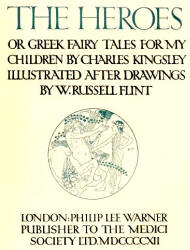
%20(sample)%20(250).jpg)
%20(sample)%20(rear)%20(250).jpg)
%20(300).jpg)
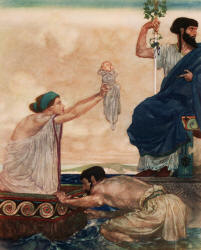
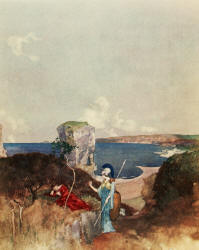
.jpg)
